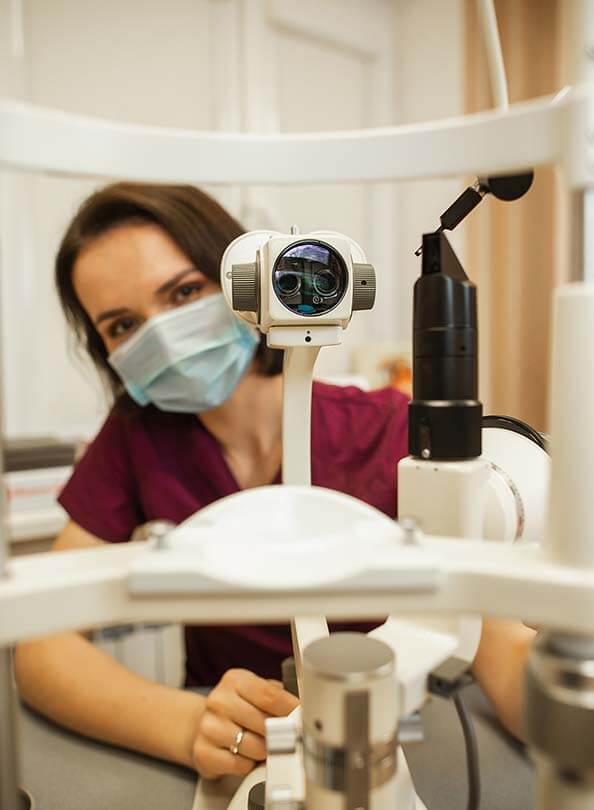Refer a Patient
iScope is currently accepting new patients. A referral from your primary care physician or specialist is required for consultations covered by your provincial plan. If you require rehabilitation services a referral is not required.
Computers and virtual screens have warped our eyes. These illnesses raise the subject of vision therapy.
Vision therapy is a tailored treatment to build, strengthen, or intensify visual skills to prevent visual process normalization.
Eyesight therapists do visual exercises to improve eyesight. Vancouver’s vision treatment doctors are all specialists.
Vision therapy treats many disorders. Effective therapy needs the development of visual talents and their connection with other systems to become automatic and allow the individual to attain their maximum potential. A prescribed visual therapy program aims to improve visual results, ease symptoms, comprehend patient needs, and improve quality of life. Expert ophthalmologists do this.

These are therapies that have undergone evaluation in the ophthalmology community. The optometrist successfully applies them. Visual therapy has shown improvements in the following areas:
The patient can engage in a variety of activities to improve their vision. You’ll have far better visual function if you do this. We always extend a warm welcome to you at our corporate headquarters in Vancouver, BC. You can also come to our clinic to discuss your issues with our experts, who also serve as eye doctors.
Regarding difficulties in learning, it is known that a large part of them is due to poor development of visual skills. All of these can be resolved with the help of optometrists.
The main visual skills we are talking about are:
We can define eye mobility as the ability to focus the eyes on a point of interest, follow moving objects, and focus on objects precisely and effectively. They are especially important when reading and playing sports.
These treatments, performed on the optometry branch, are successfully applied in the optometry clinic.
Vision therapy for children is also applied to children who have the same problems. These eye problems should be treated early in children. Otherwise, the eye problem may progress further. Especially school-age children should talk to an eye specialist and have their eyes checked.
Our vision therapy clinic, located in Vancouver BC, offers you and your children successful eye treatments. In this way, it is possible to have much healthier eyes.
Optometrists are medical professionals with a specialty on eye and vision care. They are adept in identifying various visual defects in the eyes and advising corrective measures like glasses or contact lenses. Vancouver optometrists can give pre- and post-operative care for eye surgeries, identify and treat eye conditions, and offer advice on preserving excellent eye health.
The following are the primary responsibilities and tasks of an optometrist:
Please don’t hesitate to inquire if you have any specific questions or want to know more about optometry.
Optometrists and ophthalmologists both provide care for the eyes, albeit their training and experience levels vary. Optometrists provide primary eye care in addition to diagnosing common eye conditions and issuing prescriptions for glasses and contact lenses. Ophthalmologists, on the other hand, are medical specialists with a focus on eye and vision care who are capable of performing surgeries and managing complex eye conditions.
Monday: 8:00am – 5:00pm
Tuesday: 8:00am – 5:00pm
Wednesday: 8:00am – 5:00pm
Thursday: 8:00am – 5:00pm
Friday: 8:00am – 5:00pm
iScope is currently accepting new patients. A referral from your primary care physician or specialist is required for consultations covered by your provincial plan. If you require rehabilitation services a referral is not required.
Suite 830 – 475 West Georgia St Vancouver, BC V6B 4M9
P: 1-888-550-5508
F: 604-900-7676
Coming Soon Suite 301 – 1111 Lonsdale Ave North Vancouver, BC V7M 2H4
P: 1-888-550-5508
F: 604-900-7676
Suite 301 – 3185 Willingdon Green Burnaby, BC V5G 4P3
P: 1-888-550-5508
F: 604-900-7676
Opening soon at 3670 63 Ave NE , Suite 260
Calgary, AB
P: 1-888-550-5508
Suite 500 – 89 Queensway West Mississauga, ON L5B 2V2
P: 1-888-550-5508
F: 416-900-7006
Coming Soon Virtual Clinic Now Open
P: 1-888-550-5508
© Copyright 2023 Iscope Concussion and Pain Clinics. All Rights Reserved